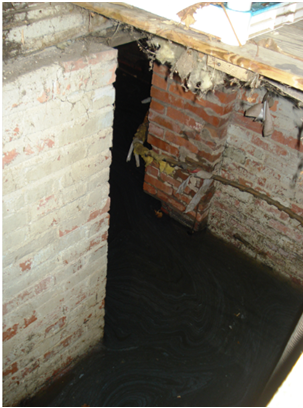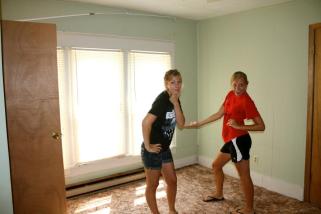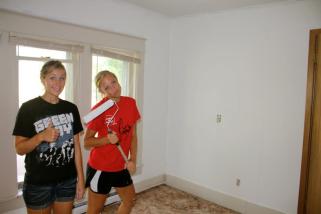Shit Storm
We cleaned the sink with bleach. We went through bottles of Febreze in the hallway. My housemate gave her dog a bath.
It still smelled.
It was something we could only guess at. Maybe one of the many cats that lived under our porch had curled up and died there. Maybe it was the dank wetness of a heavy-snow winter and the inches of rain we’d gotten earlier that week. Maybe it was both.
It was strongest just inside the kitchen door, and again at the bottom of the stairs.
We lived with the smell for months, just a dull assault when you first step in the door, dissipating soon after. Hardly noticed, getting used to it. Doing too much homework to stop. And breathe.
Which was, in retrospect, probably a good thing, the not-breathing, considering what was seeping through the floorboards of 415.
Friday afternoon the furnace went out. We’d had trouble with it before, the ancient finicky thing. But this time it wasn’t being finicky and turning itself down to sixty for no apparent reason. It was dead.
Sunday night I came back from a meeting on campus and saw two men standing on the porch. They were standing over the cellar looking down into it with the air to two men standing over a disaster.
“How’s it looking?” I asked, hunky-dory, trying to put myself at ease because of their dour faces.
“Not good,” the man closest to the cellar replied.
“Not good?” I echoed. Nervous parroting.
Then I saw why.
Water in the cellar. A lot of it. Murky, nightmarish, effluvious water.

No diving
Once the man swore he saw something moving down there in the deep. Washer and I agreed it must be an alligator.
“A gator!” he hooted. “Awwh help, thar’s a gator down here! Wounn’t that be somethin’?”
He said he would get the water pumped out overnight, that it would only take six hours. I went to bed that night thinking that when I woke up the next morning, everything would be fixed.
Everything was not fixed. Everything was worse.
It was worse. Twenty times worse. The air in my bedroom was thick and yellow, cloying and catching in my throat. It was hard to breathe. A big red rose of a headache started blooming right between my eyes. After thirty minutes I couldn’t take it anymore, got dressed, and made for the exit.
When I got to the bottom of the stairs the smell hit me full-on. Stepping into the living room was like stepping through a solid wall of stench. It was an entirely different world down there. Freezing and stinking, two things you don’t normally experience simultaneously. I put my forearm over my mouth and balked at the empty house.
What IS this?
I grabbed a granola bar and burst out the kitchen door, scaring the man who was scraping away at something at the bottom of the stairs of the now-empty cellar.
“Hi,” I muttered, more out of reflex than anything.
He was wearing a white zip-up suit with a mask that looked like a surgeon’s mask. He raised his hand and waved at me. I didn’t stay to talk. I jumped off the porch and marched down the brick street, making a break for campus.
That first day I had a headache until lunch, pounding at my skull. Washer and I met at a table in the Student Union Building and went through a surge of anger, self-pity, and anxiety.
What are we supposed to do? It’s so cold in there. It stinks SO BAD. I’ve been feeling sick all day—Me too. We can’t sleep there. Then where? I don’t know. This fucking town. What are we supposed to do?
It was the beginning of three weeks of hell, of a brush with homelessness and the stress of lemon-difficult final exams.
Here’s What Happened: In 1910, the house called 415 was built. When it was built, the plumber was either imaginative or illiterate. In any case, the plumbing was put in all wrong, an arrangement that no one in Kirksville—even the rental agency—managed to discover for 103 years.
(It’s almost like they weren’t looking.)
Sometime over that century, tree roots wormed their way through the old rusty pipes and blocked the sewage pipe. Normally when this happens, the water will back up through the toilets in the house. While undeniably inconvenient, water backing up through one’s toilets has a way of alerting a person to the fact that there is a very serious problem.
The erroneous plumbing in 415 did not afford us the luxury of knowing there was a problem. We have no idea when the first bit of raw sewage began seeping into the cellar, but it did. Raw sewage and water slowly climbed the walls until it submerged and thwarted the furnace.
A quick note about the furnace…it was located in the cellar, which was kept locked. None of us at 415 had a key, meaning none of us had access to a vital piece of equipment which was in very real danger of sparking due to the water and sewage rising around it. Luckily it didn’t and the house didn’t catch fire or explode with five college girls inside it.
To complicate matters, our property manager at the time was out of the country. He arrived only a week before our heat went out and the cellar was opened, leading to the discovery of the water and the pumping of raw sewage into the street.
Raw sewage. Into the street.
Raw. Sewage. Into. The. Street.
Looking for a real Medieval experience? Forget fairs. Come to Kirksville, Missouri.
The Results: After the water was drained, 415 smelled like an outhouse in high summer. The smell penetrated, proliferated, clung. It was impossible to stay there with no heat and that stench. The five of us scattered, relying on friends for a place to sleep and shower.
I alternated between futons, floors, and air mattresses. I lived out of my backpack and my car. I felt guilty, like a burden, sorry for everything, but with nowhere else to turn. I was disorganized, sleepless, running out of money because I had to find every meal on campus or at a restaurant.
I called my parents to ask for money and cried on the phone. Pathetic break-down time inside my parked car/mobile closet.
“Your friends want to help you,” my Mom told me. “You’re not a burden. You shouldn’t feel that way.”
I know, but I do.
“You need to be strong now. This isn’t going to last forever. You just need to focus on finals.”
I can’t focus. I don’t want to be strong. This is unfair. I want someone to see how unfair this is.
Washer and I met for lunch most days. It was tradition, the one thing that stayed normal.
“Have you been to the house today?”
“No.”
“I was there last night to get some clothes and it still reeked. My clothes smell. I had to wash them all at Airman’s house.”
“I don’t think they’re going to get this fixed.”
“I can’t keep up this homeless thing.”
“Me neither, I feel like I’m losing my mind.”
We researched. Sewage gas is dangerous. We realized we had been experiencing symptoms. One of our housemates was in respiratory distress and was given an inhaler. Mold is dangerous. It could be in the vents.
The property manager told me the only way he could tell if there was mold in the vents was when it eventually became visible by growing through the vents. There could still be mold further down which would be blowing spores at us 24-7. If this seems problematic and inefficient, remember—it’s Kirksville.
Our property manager offered to let us into an empty unit. Heat, running water, but no furniture.
We couldn’t go back to 415. I couldn’t spend the rest of the semester jumping around between friends’ houses, apologizing. I needed a home base again to keep me sane.
Besides, nothing could be worse than the Shit House.
…Right?




